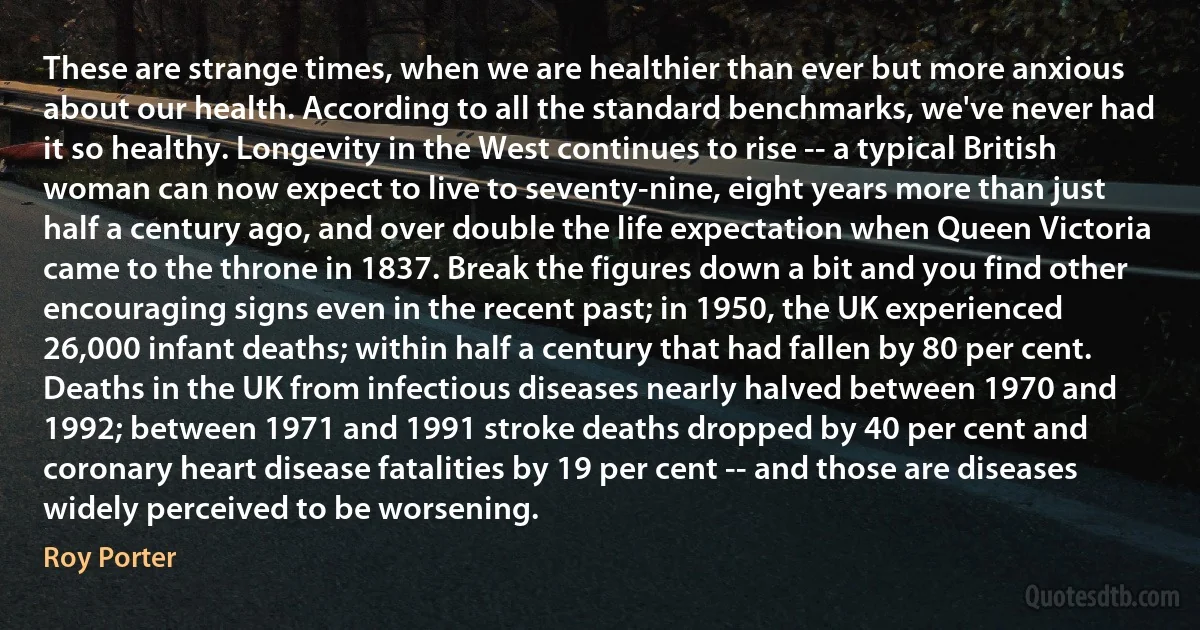
These are strange times, when we are healthier than ever but more anxious about our health. According to all the standard benchmarks, we've never had it so healthy. Longevity in the West continues to rise -- a typical British woman can now expect to live to seventy-nine, eight years more than just half a century ago, and over double the life expectation when Queen Victoria came to the throne in 1837. Break the figures down a bit and you find other encouraging signs even in the recent past; in 1950, the UK experienced 26,000 infant deaths; within half a century that had fallen by 80 per cent. Deaths in the UK from infectious diseases nearly halved between 1970 and 1992; between 1971 and 1991 stroke deaths dropped by 40 per cent and coronary heart disease fatalities by 19 per cent -- and those are diseases widely perceived to be worsening.
Roy PorterRelated topics
bit break came century coronary disease double drop eight encouraging expect fallen find half health heart infant life live now past queen rise strange stroke times typical victoria west woman years worseningRelated quotes
When I went vegetarian at age eleven, it was a remarkably easy transition. A boy at my school was attempting to kill creatures in the pond. When I tried to stop him, he said, "You eat animals,” like that meant I had no right to try and save something that could end up on my plate later. The hypocrisy of my actions became crystal clear in that moment. I decided, no more meat. ... When I first started working for two organizations supporting anti-factory farming, vegan outreach and humane education, my choice to go vegan became that much clearer. I realized veganism is the only diet that can change the world. ... You can expect a healthier body, and the feeling of pride that goes hand-in-hand with living according to your values. That's something that many people aspire to, but few people achieve.

Alicia Silverstone
Many of my Hamptstead friends may remember this 'young lady' [an ash tree] at the entrance to the village. Her fate was distressing, for it is scarcely too much to say that she died of a broken heart. I made this drawing [Study of Trees, pencil on paper, circa 1821] when she was in full health and beauty; on passing some times afterwards, I saw, to my grief, that a wretched board had been nailed to her side, on which was written in large letters: 'All vagrants and beggars will be dealt with according to law.' The tree seemed to have felt the disgrace, for even then some of the top branches had withered. Two long spike nails had been driven far into her side. In another year one half became paralysed, and not long after the other shared the same fate, and this beautiful creature was cut down to a stump, just high enough to hold the board.

John Constable
the most remarkable piece of reading that you may be recommended to take and try if you can study is a book by Goethe-one of his last books, which he wrote when he was an old man, about seventy years of age-I think one of the most beautiful he ever wrote, full of mild wisdom, and which is found to be very touching by those who have eyes to discern and hearts to feel it. It is one of the pieces in "Wilhelm Meister's Travels." I read it through many years ago; and, of course, I had to read into it very hard when I was translating it (applause), and it has always dwelt in my mind as about the most remarkable bit of writing that I have known to be executed in these late centuries. I have often said, there are ten pages of that which, if ambition had been my only rule, I would rather have written than have written all the books that have appeared since I came into the world.

Thomas Carlyle
Whatever else we can say about this referendum campaign, we have touched sections of the community who've never before been touched by politics. These sections of the community have touched us and touched the political process. I don't think that will ever be allowed to go back to business as usual in politics again. So friends, sometimes it's best to reflect where we are on a journey. 45 per cent, 1.6 million of our fellow citizens voting for independence, I don't think that any of us whenever we entered politics would have thought such a thing to be either credible or possible. Today of all days as we bring Scotland together let us not dwell on the distance we have fallen short. Let us dwell on the distance we have travelled and have confidence that the movement is so broad in Scotland that it will take this nation forward and we shall go forward as one nation. Thank you very much.

Alex Salmond
The issues raised in the historic conflict between Charles I, resting his claim to govern Britain on the divine right of kings, and Parliament - representing, however imperfectly, a demand for the wider sharing of power - concerned the use and abuse of state power, the right of the governed to a say in their government, and the nature of political freedom. The Levellers grew out of this conflict. They represented the aspirations of working people who suffered under the persecution of kings, landowners and the priestly class, and they spoke for those who experienced the hardships of poverty and deprivation. They developed and campaigned, first with Cromwell and then against him, for a political and constitutional settlement of the civil war which would embody principles of political freedom, anticipating by a century and a half the ideas of the American and French revolutions.

Tony Benn
